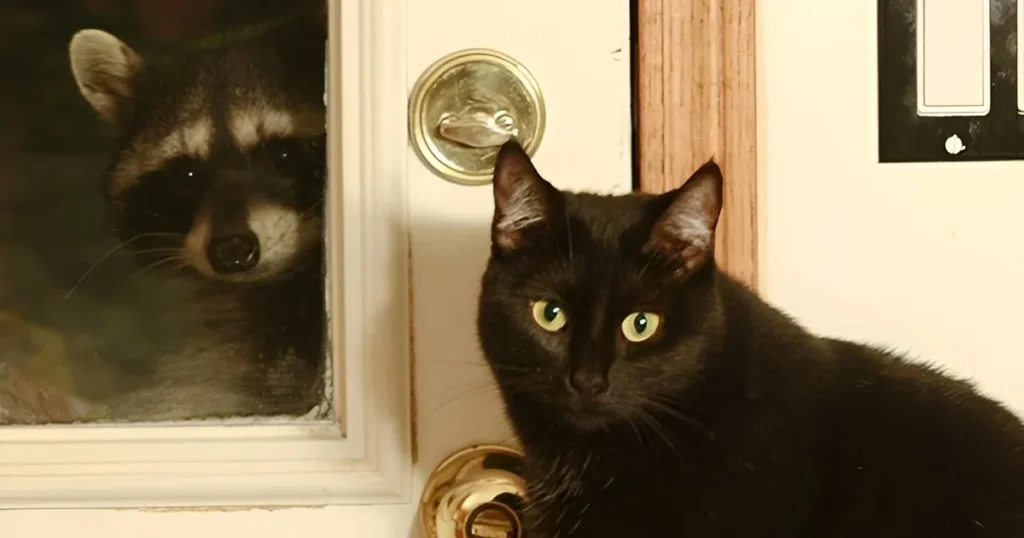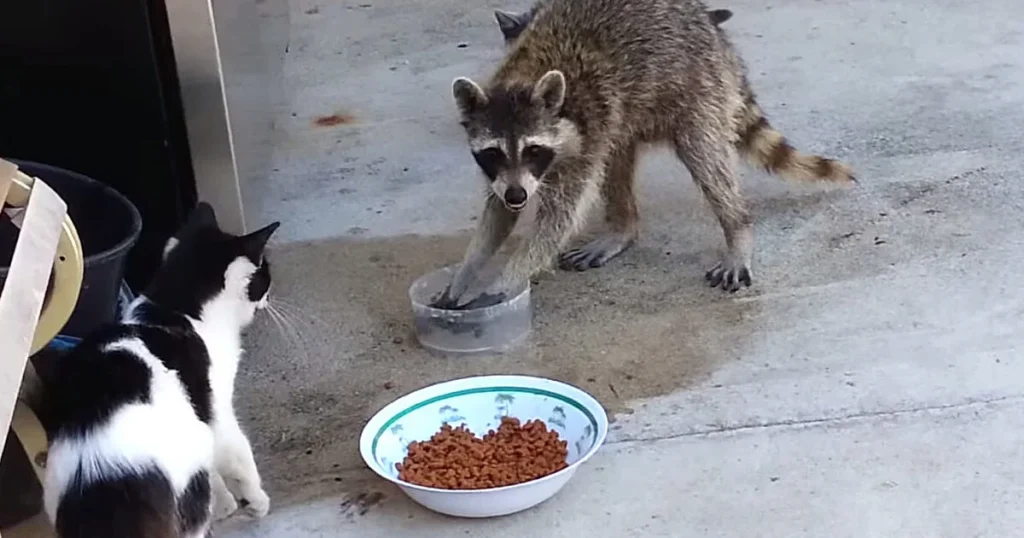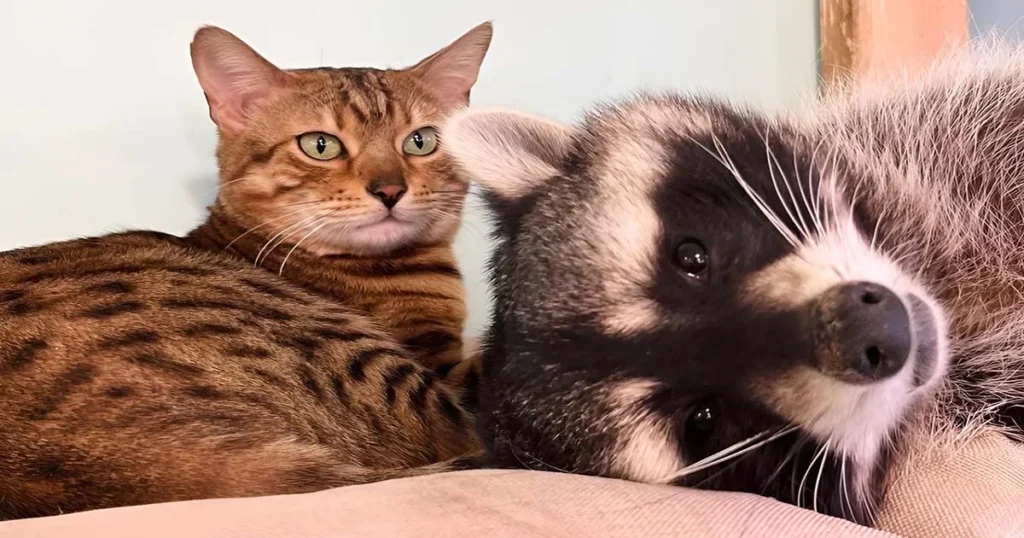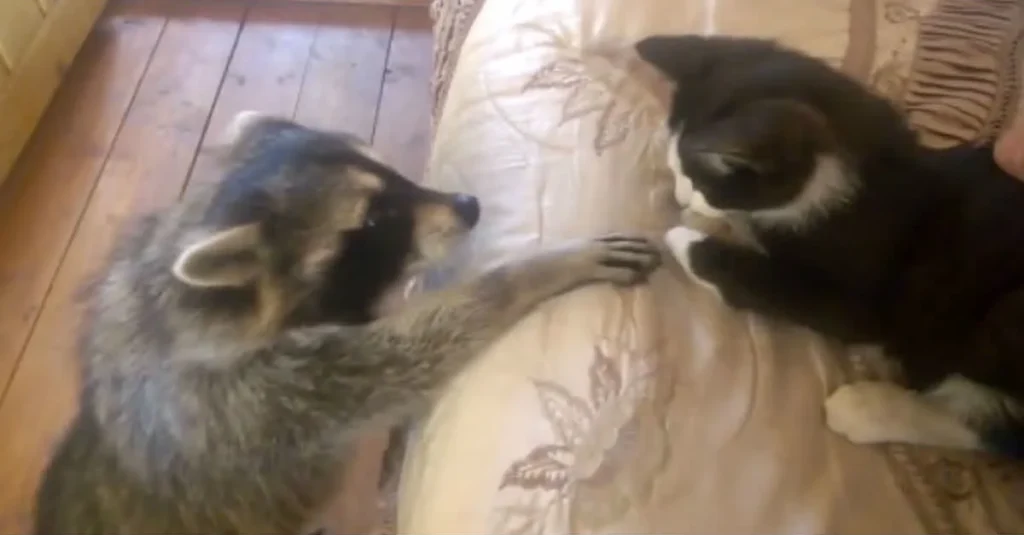
Raccoons frequently appear in numerous urban and suburban locales. While they may look cute and harmless, some individuals who own pets express worries regarding the safety of their feline companions. The question on many cat owners' minds is: will raccoons kill cats?
According to wildlife experts, raccoons are not known to actively hunt and kill cats. However, if a raccoon feels threatened or cornered, it may attack a cat in self-defense. Moreover, raccoons can transmit diseases like rabies and feline distemper, which can be transmitted to cats through bites or scratches.
Despite the relatively low risk of raccoons killing cats, pet owners should prioritize taking precautions to safeguard their their cats safe. This may include keeping cats indoors, especially at night when raccoons are most active, and securing trash cans and other potential food sources that could attract raccoons. By following these measures, pet owners can contribute to guaranteeing the safety and welfare of their cherished feline friends.

Raccoons are known to be territorial animals, and they often mark their territory by leaving their scent on trees and other objects. During mating season, typically occurring in late winter or early spring, they often exhibit heightened aggression. During this time, male raccoons may engage in conflicts with other males to establish mating rights with females. However, raccoons are generally not aggressive towards other animals, including cats, unless they feel threatened.
Raccoons are omnivorous creatures, consuming both plants and animals. They are opportunistic eaters, devouring nearly anything within their reach, including insects, fruits, nuts, and small animals. Raccoons are also recognized for scavenging food from garbage cans and dumpsters. However, they are not typically known to hunt and kill cats. In fact, raccoons and cats often coexist peacefully in urban and suburban areas.
Overall, it is important to understand raccoon behavior in order to coexist peacefully with these animals. While raccoons can be territorial and opportunistic feeders, they are generally not aggressive towards other animals, including cats. By taking steps to prevent conflicts between raccoons and cats, such as securing garbage cans and keeping pets indoors at night, it is possible to live in harmony with these fascinating creatures.

Cats and raccoons are both territorial animals and may exhibit aggressive behavior towards each other. However, the likelihood of raccoons attacking cats is relatively low. In most cases, raccoons will avoid confrontations with cats and other animals.
The level of aggression between raccoons and cats could be based on factors such as the animals' size and age, the presence of food or resources, and the degree of competition for territory. Larger, older cats may be less vulnerable to raccoon attacks, while smaller or younger cats may be more at risk.

Pet owners can take several measures to prevent conflicts between raccoons and cats. One effective strategy is to keep cats indoors, especially at night, time when raccoons show more activity. This can help reduce the likelihood of confrontations and protect cats from potential harm.
Pet owners should also ensure that outdoor food and water sources are not accessible to raccoons. This may involve securing trash cans, removing fallen fruit or nuts, and keeping pet food indoors. By reducing the availability of resources, pet owners can help discourage raccoons from entering their property and reduce the likelihood of conflicts.
In conclusion, while raccoons and cats may exhibit aggressive behavior towards each other, the likelihood of raccoons attacking cats is relatively low. Pet owners can take several measures to prevent conflicts between these animals, including keeping cats indoors and reducing the availability of outdoor resources.
One of the most effective ways to protect cats from raccoons and other predators is to create a secure outdoor environment. This can be achieved by installing a sturdy fence around the property, or by using an outdoor cat enclosure. The enclosure should be constructed using durable materials and should have a roof to prevent predators from climbing in from above. Additionally, it should be firmly anchored to the ground to deter predators from burrowing their way inside
Another way to protect cats from raccoons is to use effective deterrents. Motion-activated sprinklers present an effective method for keeping raccoons and other animals away from the yard. These sprinklers can be configured to release water upon detecting motion, which can startle and scare away animals.
Another effective deterrent is to use predator urine. You can buy these online or at a nearby hunting store. The urine of predators such as coyotes and foxes can be sprayed around the perimeter of the yard to create the illusion that a predator is present, which can discourage raccoons and other animals from entering.
It is important to note that while raccoons are known to attack cats in rare cases, they are not typically a threat to healthy adult cats. However, taking these safety measures can help ensure that cats are protected from all potential predators while enjoying the outdoors.

Raccoons are recognized as carriers of various diseases that can be transmitted to cats and other animals. One of the most common diseases is rabies, a viral infection that attacks the nervous system and can be fatal if left untreated. Other diseases that raccoons can transmit to cats include distemper, leptospirosis, and roundworm.
Distemper is a viral disease that can cause respiratory and gastrointestinal problems in cats. Leptospirosis is a bacterial infection that can cause liver and kidney damage, while roundworm is a parasitic infection that can cause intestinal problems.
To protect cats from diseases that can be transmitted by raccoons, it is important to keep them up-to-date on their vaccinations. Vaccines are accessible for numerous diseases that raccoons can transmit, including rabies, distemper, and leptospirosis. In addition, regular deworming can help prevent roundworm infections.
If there's suspicion that a cat has been exposed to a raccoon or another wild animal, it is important to seek veterinary care immediately. Timely treatment can aid in preventing disease transmission and improving the likelihood of a complete recovery.
Overall, while raccoons can pose a health risk to cats, taking appropriate precautions such as vaccination and prompt veterinary care can help minimize the risk of disease transmission.
In many regions, raccoons are classified as a protected species, and it is not llegal to harm or kill them without a permit. In the United States, the Migratory Bird Treaty Act and the Endangered Species Act are two federal laws that protect many wild animals, including raccoons. Moreover, state and local regulations may offer supplementary safeguards for raccoons and other wildlife.
It is important to note that even if raccoons are not protected in a particular area, it is still illegal to harm or kill them in a cruel or inhumane manner. This includes the use of poisons, traps that do not meet specific humane standards, and other methods that cause unnecessary suffering.
Even if it is legal to kill raccoons in a particular area, it is important to consider the ethical implications of doing so. Many people hold the belief that causing harm or killing animals, particularly those not presenting an immediate threat to humans or other animals, is morally unjust.
If a raccoon is causing problems, such as raiding trash cans or damaging property, there are humane ways to address the issue. At Critter Stop we have provided our raccoon removal services for years in the North Texas area, helping customers to protect their family, pets, and property from raccoon damages. Contact us at (214) 234-2616 to get a free estimate of our services.
Raccoons are generally not aggressive towards cats, but they can be if they feel threatened. If a raccoon feels cornered or if a cat gets too close to their young, they may attack. In most cases, however, raccoons will try to avoid confrontation with cats.
It is rare for raccoons to kill cats, but it can happen. If a raccoon is infected with a disease such as rabies, it may attack and kill a cat. In general, however, raccoons are not strong enough to kill a healthy adult cat.
Cats and raccoons are not known to get along. In fact, they may compete for resources such as food and shelter. If a cat and a raccoon encounter each other, they will normally keep their distance from each other.
As mentioned earlier, raccoons will usually try to avoid confrontation with cats. However, if a raccoon feels threatened or if a cat gets too close to their young, they may attack. It is important to keep cats inside the house at night to prevent them from encountering raccoons.
It can be challenging to get rid of raccoons without harming feral cats. One option is to use exclusion methods such as sealing off entry points to prevent raccoons from entering buildings. Another choise is to use live traps to capture and relocate raccoons. It is important to consult with a wildlife professional before attempting to remove raccoons to ensure that it is done safely and legally.
Cats are known to sometimes prey on smaller animals like raccoons, especially if they feel threatened or if they are particularly hungry. However, it's not a common occurrence, as raccoons are generally larger and more formidable than typical prey for cats. Additionally, raccoons are nocturnal animals, so encounters between cats and raccoons might not be frequent.
Visit our Critter Library and learn more about our furry friends